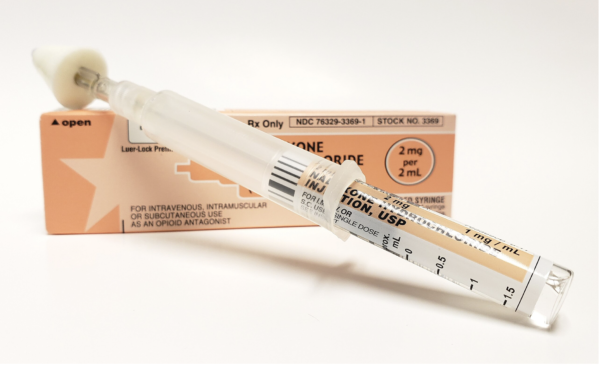
Single dose injectable Naloxone (Photo: Intropin)
A new bill backed by The American Legion, The Veterans Naloxone Access Expansion Act, was recently introduced by Rep. Anthony D’Esposito (R-N.Y.) to address opioid overdose concerns among Veterans. This legislation proposes a two-year pilot program within the VA to improve access to Naloxone, a life-saving opioid overdose reversal medication. Under the program, Veterans and their registered caregivers would have free access to Naloxone without a prescription.
Currently, the VA offers Naloxone at no cost, but a prescription is required, which Veterans must request from their healthcare provider. Registered caregivers are unable to access Naloxone through the VA, often having to obtain it through outside sources at their own expense. The American Legion has noted these limitations as significant barriers to providing timely overdose intervention for Veterans and their caregivers, calling for policy changes to improve access.
Pilot Program Details
The bill’s pilot program would be available through VA pharmacies and medical facilities, simplifying Naloxone access for Veterans and caregivers. In addition to receiving the medication, Veterans would get guidance on its use and access to resources addressing addiction, suicide prevention, and mental health. This educational component ensures that both Veterans and caregivers understand how to administer Naloxone effectively and are aware of additional support for substance use and mental health.
At the end of the two-year pilot, a report will be submitted to Congress to evaluate the program’s effectiveness. This report will assess the program’s reach, viability for broader implementation, and the benefits of expanding access to family members and other caregivers. It will also consider the financial requirements for sustaining or expanding the program.
The American Legion’s Support
The American Legion supports the Veterans Naloxone Access Expansion Act. American Legion National Commander James LaCoursiere Jr. expressed the importance of removing obstacles to Naloxone access.
“Naloxone is a lifesaving medication that has already prevented thousands of Veterans from dying of an opioid overdose. For many Americans, access to Naloxone is as easy as going to the local pharmacy. However, current VA guidelines restrict Veteran’s access to this life saving medication by requiring a prescription and forcing their caregivers to pay out of pocket in the community. The American Legion and our 1.6 million dues-paying members support the Veterans Naloxone Access Expansion Act for creating a pilot program that would remove these burdensome requirements, saving Veterans’ lives. We are proud to have worked closely with Rep. D’Esposito and his staff in writing this bill, and commend their dedication to veterans’ health and welfare,” LaCoursiere Jr. stated.
This support aligns with The American Legion’s prior advocacy efforts, such as Resolution No. 160 on Complementary and Alternative Medicine, and the Be the One Mental Wellness Committee, both emphasizing improved access to mental health resources for Veterans.
Addressing the Opioid Crisis
The opioid epidemic remains a pressing issue in the U.S., deeply affecting Veterans. In 2021, nearly 300,000 VA patients received Naloxone, with the medication credited for preventing approximately 1,950 overdoses. Passing the Veterans Naloxone Access Expansion Act could expand these life-saving results, especially for Veterans at risk of opioid overdose.
“America’s opioid crisis is affecting all Americans, especially the tens of thousands of veterans who’ve died from opioid related overdoses. Having already sacrificed so much for our freedoms, we owe it to our Veterans to expand access to life saving treatments, not restrict access with bureaucratic red tape. I am proud to introduce this bipartisan legislation to do exactly that, to provide veterans and their caregivers the lifesaving drug naloxone,” said Rep. D’Esposito.
The proposed expansion addresses concerns over limitations in overdose reversal treatments for potent synthetic opioids like fentanyl. With the growing risk of high-potency opioids, ensuring that Veterans and caregivers have prompt access to reversal agents is increasingly crucial.
Moving Forward
With bipartisan support, the Veterans Naloxone Access Expansion Act is expected to gain traction in Congress. If passed, the pilot program could pave the way for broader efforts to expand Naloxone access for other populations impacted by the opioid crisis, while addressing Veterans’ specific needs. The American Legion remains committed to advocating for measures that provide Veterans with essential healthcare resources, particularly in addiction prevention and overdose intervention.












